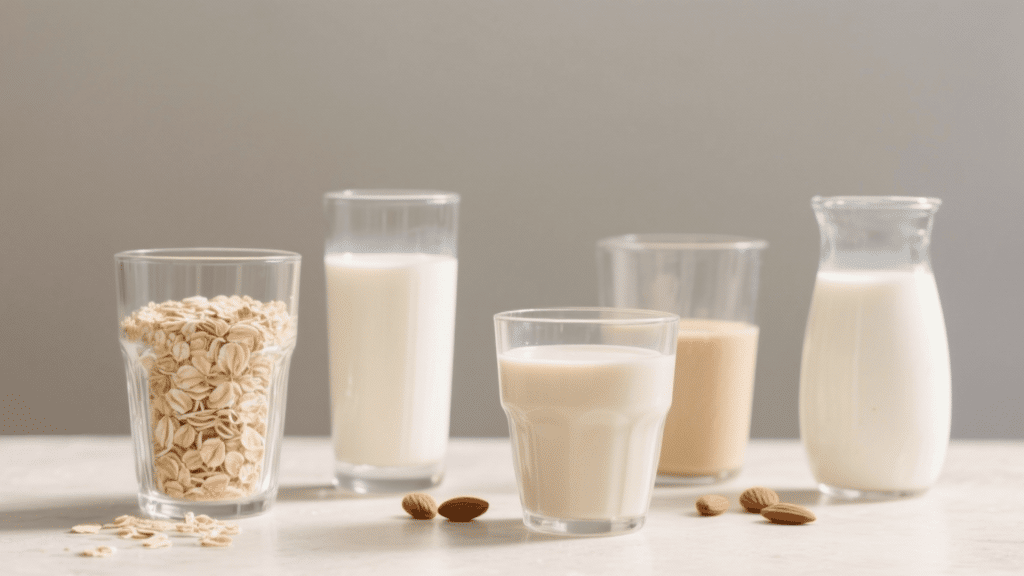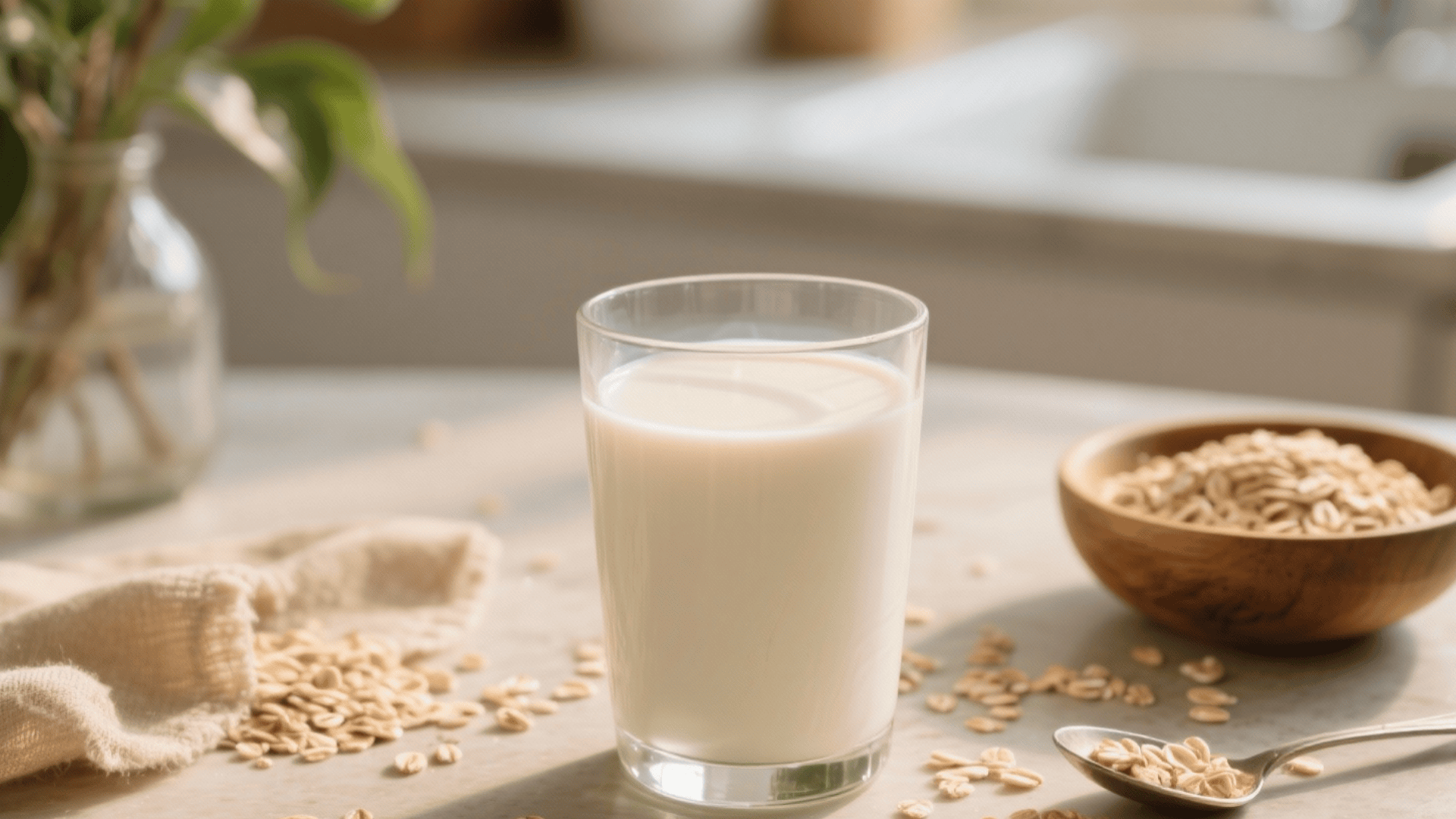Plant-based milk is everywhere these days. Coffee shops serve oat milk lattes, and grocery stores have entire sections full of dairy alternatives.
But many people wonder, Does oat milk actually offer real health benefits, or is it just another trend?
Here’s the truth: Oat milk isn’t just trendy. It comes packed with nutrients that can boost heart health, support digestion, and provide essential vitamins that the body needs every day.
This blog breaks down the benefits of Oat milk. Readers will learn how it compares to regular cow’s milk and almond milk, and discover why nutritionists recommend it for specific health goals.
Why Oat Milk is Gaining Popularity Nowadays?
It’s a creamy drink made by blending oats with water and straining out the solid pieces. The result is a smooth, naturally sweet milk that resembles dairy milk in both appearance and taste.
The popularity boom makes perfect sense. Unlike almond milk, oat milk actually froths well for coffee drinks.
Coffee shops love it because baristas can create those Instagram-worthy foam designs that customers crave. The creamy texture doesn’t separate in hot drinks either.
But taste isn’t the only reason people are making the switch. Oat milk works for almost everyone.
It’s naturally free from dairy, nuts, and soy, which are three of the most common food allergies. Parents don’t have to worry about sending kids to school with oat milk in their lunch.
Key Health Benefits of Oat Milk

When it comes to key oat milk benefits, it delivers more than just good taste. Here’s what makes oat milk stand out from the crowd.
1. Helps to Lower the Cholesterol
Oat milk contains beta-glucans, special fibers that grab onto bad cholesterol in the body. These fibers work like tiny sponges, soaking up LDL cholesterol before it can clog arteries.
Studies show that people who regularly drink oat milk experience a decrease in their cholesterol levels within weeks.
2. Supports Weight Management
The fiber in oat milk helps people feel full longer after drinking it. This means less snacking between meals and better portion control throughout the day.
At just 80 calories per cup, oat milk provides satisfaction without the extra calories. Cow’s milk has more calories and saturated fat, making oat milk the smarter choice for weight goals.
3. Great for Lactose Intolerance
People who experience stomach cramps or bloating from regular milk can drink oat milk without worry. It contains zero lactose, so digestive systems stay happy and comfortable.
Unlike cow’s milk, which causes problems for millions of adults, oat milk offers all the creamy goodness without the digestive drama.
4. Boosts Heart Health
Beta-glucans not only lower cholesterol, but they also help improve blood flow through the arteries. This reduces the risk of heart attacks and strokes over time.
Regular oat milk drinkers often see improvements in blood pressure, too. Cow’s milk contains saturated fats that can actually harm heart health, making oat milk the clear winner.
5. Improves Skin Health
The anti-inflammatory compounds in oat milk can calm irritated skin from the inside out. People with eczema or acne often notice clearer skin after switching from dairy milk.
Oat milk doesn’t trigger the hormone spikes that cow’s milk can cause, which means fewer breakouts.
6. Strengthens Immune Function
Oat milk contains antioxidants that help the immune system fight off illness better. Vitamin E and selenium work together to protect cells from harmful free radicals.
Beta-glucans also boost the activity of immune cells, helping the body respond faster to threats.
These health benefits show why more people choose oat milk every day. The science backs up what oat milk drinkers already know: this plant-based option delivers genuine health improvements.
Nutritional and Other Common Advantages of Oat Milk
Oat milk isn’t just healthy, as it’s packed with nutrients that support the body in multiple ways. The fortification process adds vitamins and minerals that make oat milk nutritionally complete.
7. Rich in Nutrients and Fiber
One cup of oat milk provides B vitamins, calcium, iron, and fiber all in one serving. The fiber content helps regulate blood sugar and keeps digestion running smoothly.
Cow’s milk has zero fiber, missing out on these important digestive benefits.
8. Supports Strong Bones
Fortified oat milk contains as much calcium as cow’s milk, plus vitamin D to help bones absorb it. This combination helps build stronger bones and prevent bone loss as people age.
The difference is that oat milk delivers these benefits without the cholesterol and excess saturated fat.
9. Loaded with Antioxidants
Oat milk contains unique antioxidants called avenanthramides that protect cells from damage.
These compounds reduce inflammation throughout the body and may help prevent the development of chronic diseases.
The antioxidant levels in oat milk are much higher than those found in cow’s milk or almond milk.
10. Perfect for Plant-Based Diets
Vegans and vegetarians can rely on oat milk for essential nutrients, free from any animal products. The creamy texture and rich taste make it easier to stick to plant-based eating goals.
While almond milk is also vegan, it’s much thinner and provides fewer nutrients per serving.
11. Low in Harmful Fats
Oat milk contains mostly heart-healthy unsaturated fats instead of the saturated fats in cow’s milk. This helps regulate cholesterol levels and supports overall heart health.
The total fat content is also lower, making oat milk lighter without sacrificing taste or nutrition.
12. Promotes Healthy Digestion
The soluble fiber in oat milk feeds good bacteria in the gut, promoting better digestive health. This prebiotic effect helps maintain a healthy gut microbiome, supporting immunity and overall well-being.
Cow’s milk can sometimes cause digestive problems, especially for people with sensitivities.
13. Provides Sustained Energy
The complex carbohydrates in oat milk release energy slowly throughout the day. This helps prevent energy crashes and maintains stable blood sugar levels.
The fiber slows down sugar absorption, preventing the spikes and dips that come with sugary drinks.
These nutritional advantages make oat milk a smart choice for anyone focused on health. With all these benefits of oat milk packed into one creamy glass, it’s easy to see why oat milk has become the go-to healthy milk alternative.
Is Oat Milk Healthier than Other Milk Types?

With numerous milk options filling grocery store shelves, choosing the healthiest one can be overwhelming. People want to know which milk actually delivers the best health benefits of oat milk for their families.
| Health Benefit | Oat Milk | Cow’s Milk | Almond Milk | Soy Milk |
|---|---|---|---|---|
| Heart Health | Zero saturated fat, beta-glucans lower cholesterol | 3-5g saturated fat per cup may increase heart disease risk | Very low saturated fat, heart-friendly | Low saturated fat, heart-healthy |
| Digestive Health | Lactose-free, prebiotic fiber feeds gut bacteria | Contains lactose, which causes problems for 65% of adults | Lactose-free, easy to digest | Lactose-free, but may cause gas for some |
| Protein Content | 3g per cup, moderate muscle support | 8g per cup, complete protein for muscle building | Only 1g per cup, minimal muscle support | 7g per cup, excellent for muscle building |
| Weight Management | Lower calories (80), high fiber for fullness | Higher calories (150), less filling | Very low calories (30-50), minimal satiety | Moderate calories (100), good satiety |
| Blood Sugar Control | Fiber helps stabilize glucose levels | Can cause blood sugar spikes | Minimal impact on blood sugar | Lower carbs, stable blood sugar |
| Bone Health | Fortified with calcium and vitamin D | Natural calcium and vitamin D | Fortified but lower bioavailability | Fortified, good calcium absorption |
| Allergy Concerns | Gluten-free oats, minimal allergens | Contains lactose, a dairy allergen | Nut-free for tree nut allergies | Contains soy, a major allergen for many |
While other milks have their strengths, oat milk offers the best balance of heart health, digestive support, and nutritional value.
How to Incorporate Oat Milk Into Your Diet?
Adding oat milk to daily meals is actually pretty simple. The creamy texture and mild taste make it easy to swap into favorite recipes and drinks while enjoying the benefits of oat milk.
Most people find that oat milk works better than other plant-based milks in almost every situation.
- Start with morning coffee or tea: Oat milk froths beautifully and doesn’t curdle in hot drinks like some alternatives do. The natural sweetness means less need for added sugar, making morning beverages healthier
- Use it in breakfast cereals and oatmeal: The creamy consistency pairs perfectly with both hot and cold cereals. People often say their cereal tastes richer with oat milk, plus they get extra fiber to start the day right
- Blend into smoothies for extra creaminess: Oat milk makes smoothies thick and satisfying without adding too many calories. The fiber helps people feel full longer, making it perfect for meal replacement smoothies
- Substitute in baking recipes: Most baking recipes work great with a simple 1:1 swap from regular milk to oat milk. Muffins, pancakes, and cakes often turn out even moister and more flavorful than the original versions.
- Make creamy soups and sauces: Oat milk adds richness to cream-based soups without the heavy feeling of dairy. It won’t separate when heated, making it perfect for pasta sauces and creamy vegetable soups.
- Try it in overnight oats or chia puddings: The natural thickness creates perfect texture for make-ahead breakfasts. Adding oat milk to overnight oats creates maximum cholesterol benefits.
The health benefits happen automatically when oat milk replaces less healthy options throughout the day. Within weeks, most people notice that they feel better and no longer miss regular milk at all.
The Bottom Line
Unlike trendy superfoods that promise miraculous results, oat milk delivers measurable improvements in heart health, digestion, and weight management.
These oat milk benefits accumulate with regular use, resulting in lasting, positive changes to overall wellness.
The way forward is simple, just replace dairy milk with unsweetened oat milk in your daily routine. Start with morning coffee, then expand to cereals and cooking.
Within a month, most people experience improved digestion, stable energy levels, and better cholesterol readings, showing small dietary changes can lead to significant health improvements.







